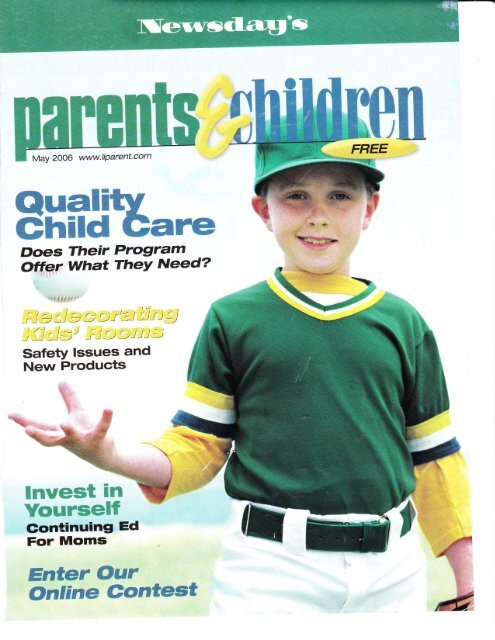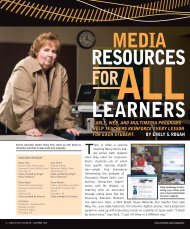What Quality Childcare Looks Like - Emily Rogan
What Quality Childcare Looks Like - Emily Rogan
What Quality Childcare Looks Like - Emily Rogan
You also want an ePaper? Increase the reach of your titles
YUMPU automatically turns print PDFs into web optimized ePapers that Google loves.
May 20O6 www'liParent'com<br />
Gluality<br />
Ghild Garc)<br />
Does Their Program<br />
Off,Sf <strong>What</strong> TheY Need<br />
'{gi**n$.}Srri'<br />
;j e :l:; :: :t-/=-t -li-rt g<br />
I1 :l:) ]-i u t-trt J<br />
SafetY lssues and<br />
New Products<br />
tnwest In<br />
Vcrurself<br />
Gontinuing<br />
For Moms<br />
Ed<br />
Enter Our<br />
Online Gonfest
The playground at AdeLphi<br />
University's Chitd Activity Center<br />
in Garden City bustLes with<br />
preschooters throwing batts,<br />
climbing equipment and ptaying<br />
in the sand. Inside during circte<br />
time, four- and five-year-olds [isten<br />
and respond as the'ir teacher<br />
guides them through a book<br />
' about the alphabet and its meaning<br />
in sign [anguage.<br />
This is just one snapshot of<br />
child care on Long Island, but<br />
there are thousands more like<br />
them. Here 46 percent of chitdren<br />
under five years old - 74,000<br />
chjldren - are jn preschoo[ or<br />
child care, according to a survey<br />
conducted by the Rauch<br />
Foundation in May 2003.<br />
Chitd care includes centers,<br />
Head Start programs. pre-K programs<br />
and fami[y chitd-care<br />
homes, where neighbors are<br />
licensed to care for up to six chitdren.<br />
The search for care can be<br />
daunting for parents; the decision-making<br />
process often overwhetms<br />
them. But perhaps the<br />
biggest chattenge facing parents,<br />
' and one they might not always<br />
64 iTEWSDAPS PAFEIVI',IS & CHtt-OnEN www.liparent.com nay gssg
,,,li.i f 1..;,.<br />
fltu{&d<br />
consider, is whether the situation they choose provides quality care.<br />
But parents may not know exactly what quatity means when it<br />
comes to entrusting their children to someonetse - or how<br />
'imoorlant it is.<br />
Early chil.dhood education experts agree that quatity is much more<br />
than simpl.y meeting state health and safety regulations. "Early brain<br />
development sets the pace for the rest of [ife," says Dana Friedman,<br />
Ed.D.. project director of Early Care and Education-Long Istand (ECEU),<br />
a collaboration of experts on parenting and chitd devetopment dedicated<br />
to improving the qual.ity of earty chitdhood services on Long Istand.<br />
Over the last five years, Friedman says, researchers have confirmed<br />
that. "you cannot separate intellectual. social and emotional devetopment<br />
and that relationships in the early years are the most critical for<br />
later schooI success."<br />
In fact, 85 to 90 percent of brain capacity in terms of that deve[-<br />
opment is formed by age five. Yet 95 percent of our investment in public<br />
education doesn't begin untit after that age. says Diane Cohen.<br />
executive director of the Long Istand Fund for Women and Girts, which<br />
atong with the Long Istand Women's Agenda. is giving $50,000 annuat-<br />
[y to parent education and advocacy groups for a new awareness campaign.<br />
The Earty Years Matter: <strong>What</strong> Every Parent Needs to Know.<br />
"Thafs why ifs crucia[ that parents selecthe type of chitd care programs<br />
that witl best promote their chi[d's devetopment."<br />
Ifs easy to understand why parents and chitd-care providers are<br />
confused by the word "quatity." Pressure for students to perform we[[<br />
in schooL and on state assessments, to be admitted to highly competitive<br />
cotleges and the emphasis from the media on how American<br />
students compare to their internationaI peers, has led parents and<br />
care givers to beUeve that highty structured, academic earty care wi[[<br />
make chjLdren better prepared for the future. Parents are swayed by<br />
centers that promise to teach reading, writing and math. But says,<br />
Friedman, 'You don't need an academic program for children to succeed<br />
acaderirically later in schoot." Instead, chitdren need adutts to speak<br />
to them and ask them questions and encourage them to ask questions.<br />
Childre need safe, accessiblequipment to satisfy their curiosity.<br />
And most importantly, they need to have their feelings validated and<br />
feel loved.<br />
To address the issue of quatity care on Long Island, Friedman, a<br />
nationatty renowned researcher and poticy analyst, created a study with<br />
ECELI to anatyze the current state of chitd care on Long Island and<br />
determine where improvements are needed and how those changes<br />
might be imptemented. While there are no avaitabte [oca|' statistjcs as<br />
to the number of quatity care centers here, ECELI is trying to establish<br />
basic standards that are understood and recognized by providers -<br />
and parents - across the area. These standards include educated<br />
staff, age-appropriate curricutum, facitity, parentat support and ctear<br />
discio[ine orocedures.<br />
Here's what you should see in a day care or<br />
private chitd care setting that indicates the<br />
program is of good quatity:<br />
I There should be low staff turn-over to<br />
support consistency in care.<br />
I There should be a high ratio of adutts to<br />
chitdren.<br />
r Children in atl-day child care need a ptace<br />
to curt up and relax. Is there batance between<br />
active and peaceful time<br />
I Are staff members really tatking to chiLdren,<br />
rather than giving directions Are they<br />
asking open-ended questions to eticit thoughtfuI<br />
responses<br />
I Chitdren aren't quiet peopte, so if the<br />
facitity is too quiet, something is making them<br />
that way - it couLd be fear.<br />
I The caregiver should be at the chitdren's<br />
tevet. If the kids are sitting on the ftoor, their<br />
caregiver should be as welt.<br />
I Caregivers shoutd be engaged with the<br />
chitdren. The chitdren shouldn't be ptaying on<br />
one side of the room while the teachers are in<br />
a group on the other.<br />
I Is the director accessibte and visible<br />
throughout the day Doe she make hersetf<br />
avaitable to parents when they have questions<br />
and concerns<br />
I Overa[[, there should be music, singing,<br />
laughter and a general lightness of spirit<br />
throughout the center.<br />
- <strong>Rogan</strong><br />
66 ,VEWSDAy'S PARE TTS & CH,LDREN www.liDarent.com
Long Island Swim School<br />
From Be$inner to 0lYmPian<br />
Your child's first activirY should<br />
be one that can save their life.<br />
.-., i<br />
Swrng$f*-#flrf#<br />
Lons Island Swim School is the teaching<br />
arm"of the Lons lsland Aquatic Club' a USA<br />
Swimmine National Program of Excellence'<br />
Classes are held year round at the:<br />
CMS Vellnest Center Omni Building<br />
35Earle Ovington Blvd., Uniondale<br />
CALL US AT 516.378.8467<br />
email: longislandswimming@hotmail'com<br />
or register on the-web: longislandswimming'com<br />
Nurturing a chjl.d's development begins with a know[edgeabte<br />
and wel,l"-trained caregiver who knovrrs whafs appropriate<br />
for chil.dren at each stage. Parents need to understand that<br />
just because a [icensed program has met some basic heatth<br />
and safety standards it isn't necessarity a high-quatity educational<br />
program, says Nancy 0Lsen-Harbich, human development<br />
speciatist at the Cornetl Cooperative Extension in<br />
Riverhead. "High-quality programs happen only if you have<br />
high qual.ity staff," she saYs-<br />
That comes when the staff understands the difference<br />
between devetopmentaL milestones on paper and developmental<br />
mitestones of an individuat chitd, says Joann Bousquet'<br />
executjve director of Hi-Hetto <strong>Childcare</strong> Centelin Freeport and<br />
founder of the Hi-Hel.to Training Institute' "Ifs our chaltenge<br />
to educate our staff as to what these milestones are so that<br />
they can recognize when the child is going through it and<br />
guide him to that goat," she saYs.<br />
The staff shoul.d al,so understand that chitdren need good<br />
experiences from which to draw as they grow, as they p[ay'<br />
through their contacts with adutts, through nurturing and<br />
caring and feel.ing safe and secure. says Janet Walerstein'<br />
executive director of the Chil'd Care CounciI of Suffotk'<br />
In addition to staffing, curriculum and how the staff<br />
imptements it is an important element for parents to consider.<br />
As far as infants are concerned, lVaterstejn says children<br />
shouLdn't be teft for long penods of time' "Even during diapering<br />
there should be conversation. Reading books even to<br />
infants is crucia[ to brain devetopment," she says'<br />
0tsen-Harb'ich says that a good teacher uses the interests.<br />
curiosity and needs of the chi[dren to determine how<br />
she's going to ptan for the chitdren. "So jf a chitd has a sib-<br />
Ling who's sick," she says, "the teacher might set up a littte<br />
hospital. for the child to act out how he feets"'<br />
Dai[y routines must inctude physicat activity' "Chitdren<br />
shoutd go outside in al't kinds of weather," says Walerstein'<br />
"Its on the playground where chitdren learn to give and take<br />
with their peers, as we[[ as devetop their gross-motor ski[ts"'<br />
Hand-in-hand with curricutum is the room set-up ano<br />
equipment. According to Walerstein the room should jnctude:<br />
I a good btock area for chitdren to integrate story-tetting<br />
with btock buil"ding;<br />
I a famity-center/housekeeping corner with dress-up<br />
ctothes;<br />
I easets with lots of Paints and
fl*re<br />
.Llh€A#<br />
jii!<br />
t a lot of good literature.<br />
Atice Brown. director of AdeLphi's Chitdhood Activity Center<br />
says children need to have access to these materials and good<br />
equipment to stimutate their senses and develop thinking on a<br />
very organic levet.<br />
Par**ta l .:,: I ;:: *qj;' r<br />
In a quality setting, parents wjtl have access to the program<br />
- whenever they want. Jan Barbieri, executive director of the<br />
Chitd Care CounciI of Nassau. says that a child-care program<br />
should have an open-door policy for parents to come in any time,<br />
whether announced or unannounced. In addition, the provider<br />
should offer as much parental supporto strengthen the learning<br />
and growth happening in chitd care each day. Conferences.<br />
newstetters and [ending fibrariestocked with child-devetopment<br />
books are alt importantoots to help parents.<br />
Parentshoutd atso ask providers about their discipLine<br />
phitosophies. "There should be a certain tone of mutual respect<br />
between chitdren and their caregiver," says Barbieri. "With<br />
preschooters you shouldn't heat You have to say you're sorryj but<br />
rather questions that witl. prompt probtem sotving and elicit a so[ution<br />
from the children."<br />
Walerstein adds, "The caregiver shoutd know what to expect<br />
from a two-year-otd. You shoutdn't hear, You're a big boy, don't<br />
cry'or'Be a good boyl"<br />
Teachers need to have realistic expectations of chitdren at<br />
each devetopmental stage. "A high-quatity teacher needs to know<br />
ways to re-direct a pre-verbal toddler to keep him from biting,"<br />
says Bousquet.<br />
A quat'ity program hetps to prepare children for their schoot<br />
years. But schoo[ readiness doesn't come from flash cards and<br />
math driLLs. and in fact, when an earty-care program is too academic,<br />
children may actuatly devetop behavioral problems because<br />
they're not capabte of listening for long periods of time.<br />
"Many parents are lured by high-tech, computer-driven curriculum<br />
at new, state-of-the-art chitd care centers," says Walerstein.<br />
"They're so scared that their kids aren't going to achieve, that<br />
they're attracted to anything that pushes cognitive development.<br />
They don't understand what real tearning is. It comes through<br />
experiences, reading, going to museums, going to the park and<br />
just hanging out."<br />
Research supports the fact that when chitdren have positive<br />
experiences in quatity earty care, the benefits are clear. In a recent<br />
potl sponsored by the organization Fight Crime: Invest jn Kids, 78<br />
to 93 percent of 800 kindergarten teachersurveyed nationwide<br />
said that children who had attended quality pre-kindergarten<br />
programs were more tikety to:<br />
I get atong with others and be sensitive to their feelings;<br />
I count;<br />
I possess problem-solving skj[ts;<br />
I know letters of the atphabet;<br />
t foltow directions and<br />
I be less disruptive in class.<br />
i i:;le i *1., f-il::,t;lci<br />
Friedman says that what kids need in their child-carexperience<br />
is the same across a[[ different kinds of programs. Through<br />
her efforts. ECELI is working on innovationsuch as a <strong>Quality</strong><br />
Rating System. a kind of Zagat guide to quality chitd care.<br />
Advocates and professionals have their work cut out for them, but<br />
most are optimistic; increasingly the chil.d care industry js becoming<br />
recognized as a significant component of our economy.<br />
Thafs important for chitdren like Tycho Ati of Huntington, who<br />
recites the names of his daycare friends and teachers before fatling<br />
asteep. And for El.j Bank of Green[awn, whose caregiver knows<br />
everything about him: what he likes and doesn't fike and when to<br />
give him space if he's in a bad mood. And for a[[ the other chjldren<br />
on Long Island. who. says Walerstein, "are going to be our next<br />
generation of good thinkers and inventors, peopte who use their<br />
imagination." 6<br />
<strong>Emily</strong> S. Rogon is a freelance writer who lives in<br />
Huntington with her husband and two children.<br />
70 NEWSDAYS PABENTS & CHiI-DREN wwwliparentcom ,']i-ti' .l{.ii:'l




